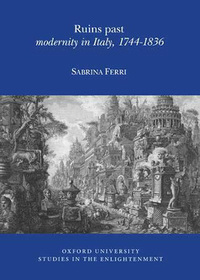
- University of Notre Dame
- Associate Professor
- Residential Fellow (2012-2013)
- “Temporal Ruinations: A History of Time in Italy, 1744-1836”
Sabrina Ferri is Assistant Professor of Italian at the University of Notre Dame. She specializes in the Italian eighteenth and nineteenth centuries, with an interdisciplinary focus on literature and its relationship to art, science, history, and philosophy. Her present research focuses on the significance of material and metaphorical ruination in the intellectual production of the late Enlightenment and early Romantic periods.
She has written on Vittorio Alfieri’s physiological sublime, on ruins and melancholy in pre-Romanticism, as well as on Giacomo Casanova and on Giambattista Vico. She is currently completing a book manuscript entitled “Temporal Ruinations: A History of Time in Italy, 1744-1836.” The book uses the imagery of ruins and material decay in Italian literature, non-literary texts, and art to reconstruct the development of different conceptions of time in Italy at the dawn of modernity. Professor Ferri is the former recipient of a Geballe Dissertation Fellowship at the Stanford Humanities Center (2006), a Postdoctoral Fellowship in the Introduction to the Humanities Program at Stanford University (2007-2009), and is currently a Fellow of the Nanovic Institute for European Studies at the University of Notre Dame.
Publications
-
Ruins Past: Modernity in Italy, 1744-1836
Oxford University Press, 2015

In an era haunted by its past, modern Europe sought to break with the old; the future and the new became the ideal. In Italy however, where the remains of the past dominated the landscape, ruins were a token both of decadence and of the inspiring legacy of tradition. Sabrina Ferri proposes a counter-narrative to the European story of progress by focusing on the often-marginalized and distinctive case of Italy.
For Italians, ruins uncovered the creative potential of the past, transforming it into an inexhaustible source of philosophical speculation and poetic invention whilst simultaneously symbolizing decay, loss and melancholy. Focusing on the representation of ruins by Italian writers, scientists, and artists between the mid-eighteenth and early nineteenth centuries, Sabrina Ferri explores the culture of the period and traces Italy’s complex relationship with its past.